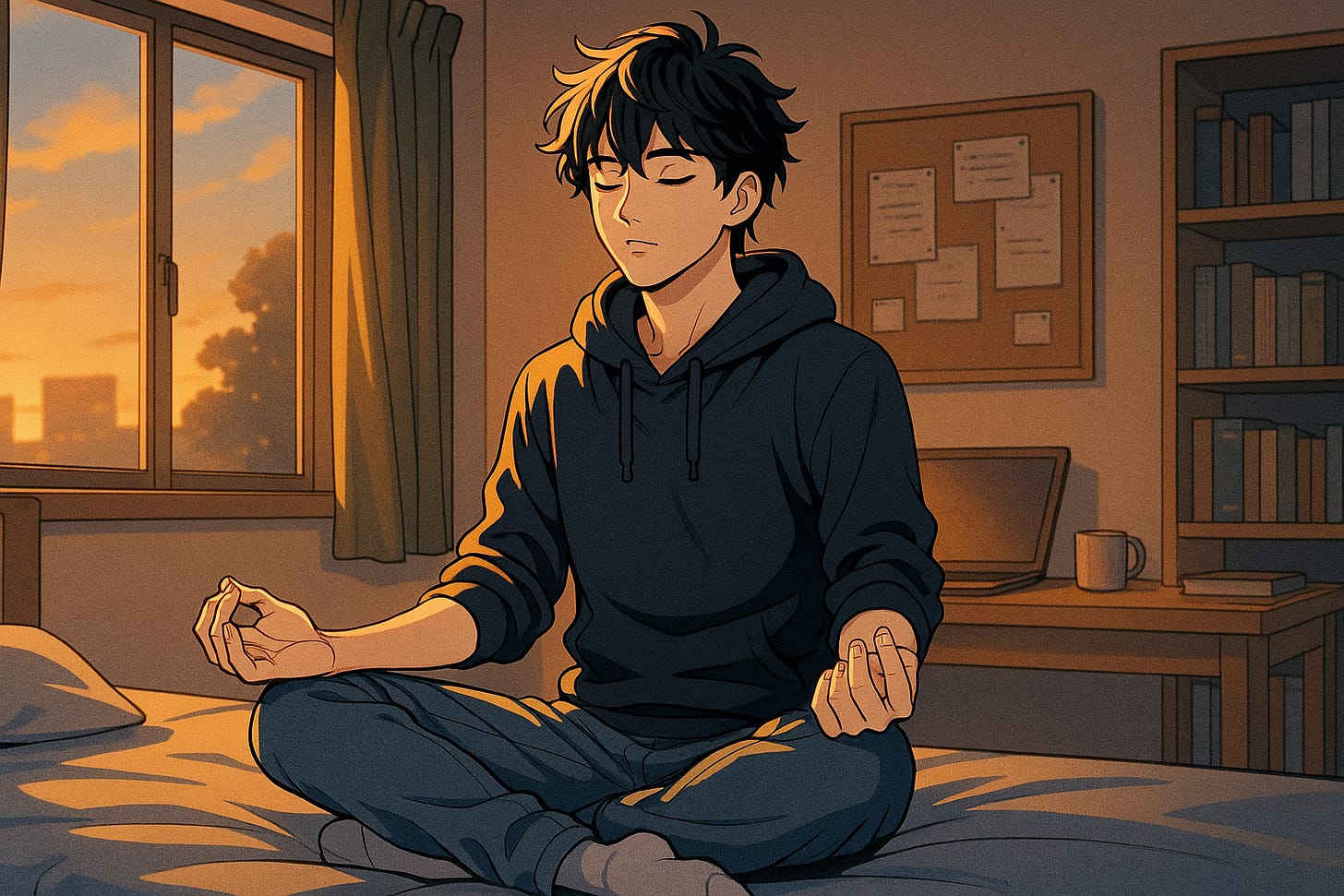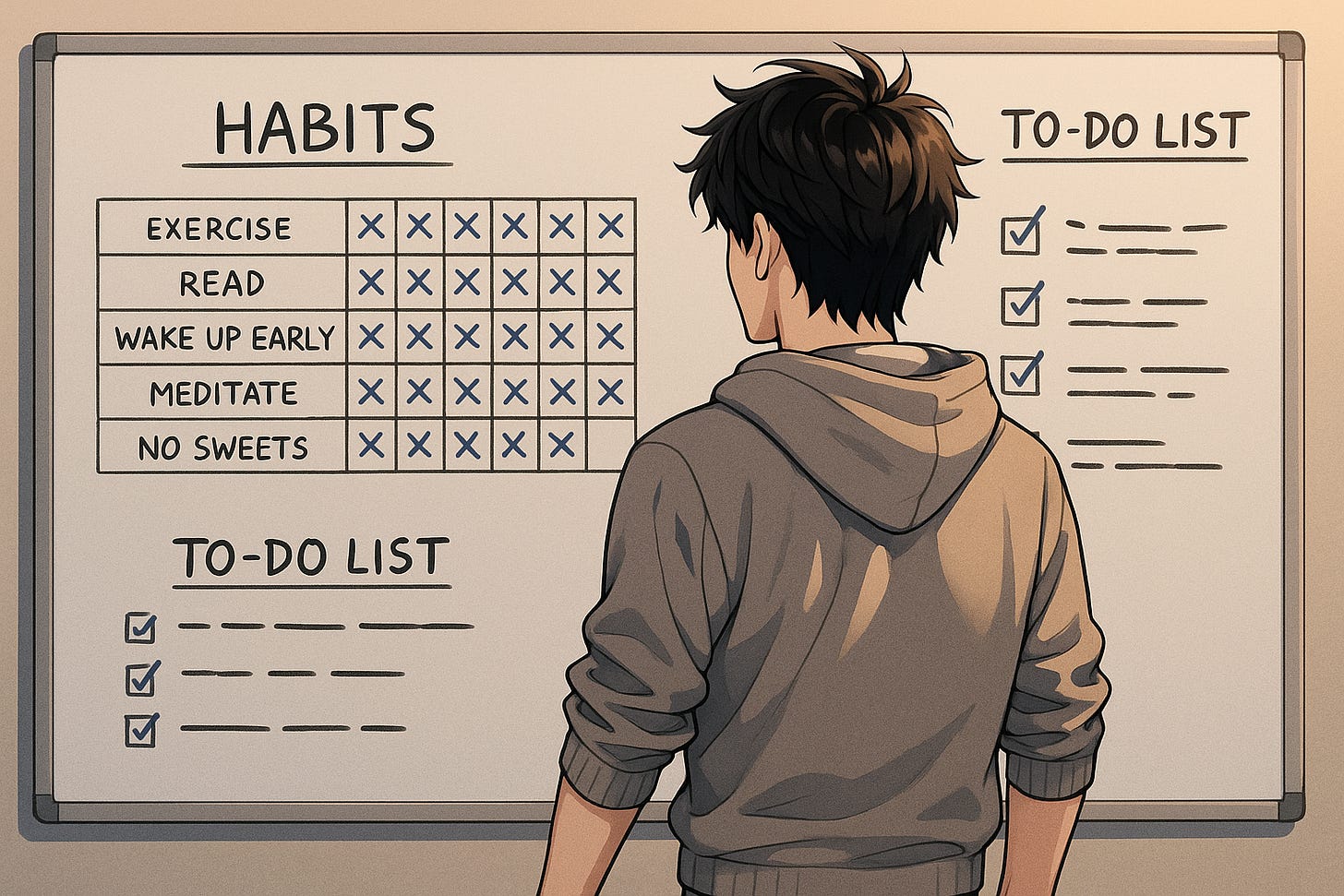are you using productivity – or is it using you?
We've mastered the art of getting things done—but forgotten to ask what any of it is for.
How productivity changed society and society changes productivity
Historically, the term productivity (the rate at which a person, company, or country does useful work) was relatively easy to measure. Take agriculture, for example—the amount of crops per square meter. There was a very clear measure when trying to figure out the input-output ratio.
And these ratios changed: Human history is shaped by inventions aiming to skyrocket the productivity of a given field:
James Hargreaves' Spinning Jenny revolutionized textile production in the 18th century.
Sir Sandford Fleming's idea of standardizing time measurement in the 19th century led to time zones and the Greenwich Mean Time as a global standard—enabling international coordination on a minute-by-minute basis.
Henry Ford's conveyor belt system in the early 20th century reduced the time to produce a car (the Model T) from 12.5 hours to just 93 minutes.
Jump forward 100+ years into the 21st century. Today's (Western) world is a different one. We've moved from factory floors to digital workspaces—where output isn't widgets, but ideas. Where value is abstract. And where AI is reshaping what it means to be "productive" altogether.
Living in a meritocratic, achievement-oriented society, one's "usefulness" is still measured by economic contribution—consequently, by productivity. People like Gary Vee have built personal brands around hustling, working long and hard hours.
The problem? The input-output relation is distorted. In knowledge work—where value is created by processing and providing information, using your brain more than your hands, and leveraging digital tools—you can no longer clearly correlate input (your time) with output (money earned, deals closed, etc.).
This shift gave rise to a new focus: personal productivity. In other words: "How can I get more done in the time I have?"
Countless tools and ideas emerged:
Habits: James Clear's Atomic Habits, Robin Sharma's The 5AM Club, Cal Newport's Deep Work
Productivity frameworks: Gary Keller's The One Thing, David Allen's Getting Things Done, Brian Tracy's Eat That Frog
Software: Todoist, Notion, Obsidian, and many more
People have become obsessed with finding the next hack or better software. Knowledge workers are optimizing themselves more and more.
But the actual question should be: to what end? Are we truly benefiting from these tools—or becoming enslaved by them?
Three productivity traps
Before we talk about what purposeful productivity could look like, it's worth noticing the traps we tend to fall into. These aren't just quirks—they're patterns that shape how we work, how we feel, and ultimately what we build.
01 The hamster wheel trap
Even though self-optimization might increase your productivity and help you get more done in the same amount of time, it's delusional to think this will automatically free up time for other things. More often, the opposite happens.
Take the introduction of emails, for example. The expected time effort for communication dropped dramatically—especially when compared to sending handwritten letters. But instead of reclaiming time, we ended up with overloaded inboxes and rising expectations to always be available.
This is the trap where self-optimization turns into self-exhaustion. You're optimizing to feel in control—but end up feeling constantly behind. The hustle speeds up, but the direction gets blurry. What begins as discipline slips into compulsion—and before long, your mental health takes the hit.
02 The best-practice trap
There seems to be a best-practice script:
Wake up at 5
Do 10 minutes of meditation
Hit the gym for an hour
Shower coldly
Deep work for two hours – and so on...
Productivity, in this version, becomes undifferentiated and blind. We lose track of the fact that productivity is a tool to reach our goals—not the goal itself. Just because a routine works for someone else doesn't mean it aligns with your rhythms, goals, or values.
Take meditation, for example:
Yes, science supports its benefits. But why are you doing it?
Because it helps you become more mindful? Great.
Because everyone else is doing it? Maybe not the best reason.
03 The dashboard trap
You're "feeling productive" because your dashboard looks full—but have you actually moved closer to anything that matters?
In this trap, productivity becomes performative. You measure everything, track every minute, and quantify every task—but forget what any of it is for.
Think: time trackers, habit streaks, graph-filled dashboards, optimization cycles. You end up managing your productivity system more than your actual work.
Instead of getting things done, you're getting things logged. Tools like Notion, Obsidian, and others become the work—when they were just supposed to support the work.
The issue: when metrics become the proxy for meaning. If you're optimizing without intention, you might just be automating distraction.
I've definitely found myself spending 30 minutes color-coding a task list instead of actually doing the task. Sound familiar?
Realigning productivity with purpose
To what end are you optimizing yourself?
Productivity is a means to an end—not an end in itself. It's fine to enjoy organizing your digital space or tinkering with workflows. But we need to be careful:
Are you prioritizing real progress—or just polishing your second brain?
Is it about making things happen—or just preparing to?
What productivity is not:
It's not obsessing over the perfect note-taking app. Not constantly switching systems. Not spending more time organizing than doing.
Productivity should not become a performance of control. Yes, it's fun to design aesthetic Notion dashboards and have a clean desktop (guilty as charged). But if your goal is meaningful output, this can quickly become misleading.
James Clear describes the difference as action vs. motion:
"When you're in motion, you're planning and strategizing and learning. Those are all good things, but they don't produce a result. Action, on the other hand, is the type of behavior that will deliver an outcome."
Me thinking about what to write or sketching rough outlines = motion
Me actually writing this and publishing it = action
How to realign:
Think of what you do rather than how you do it
Instead of getting caught up in techniques, aesthetics, or tools—zoom out. Productivity only matters if it helps you create something that matters.
Real productivity isn't about how busy you look. It's about whether what you do moves the needle—on what you care about.
Don't let productivity become your identity. Let it serve your direction, not define it.
Clean dashboards, flawless routines, streak counters—they're fun, and sometimes helpful. But real progress starts when you stop optimizing for motion and start moving with intention.
Ask yourself: what am I actually trying to build here?
Think of doing nothing at all
Sometimes the most productive decision is to pause altogether. Rest is not the opposite of productivity—it's part of the cycle. Stepping back creates space for clarity, creativity, and actual prioritization.
And even if it’s not ‘rest’, but grabbing drinks with your friends on a Sat afternoon. Life does not always have to serve a productive purpose. You might also just do things because the pointlessly bring you joy. Full stop.
No matter which of these two—keep in mind: Productivity is the tool. You're the architect.







Totally seeing the “Miracle Morning” trap: people jump into it with the initial excitement of the trend, following it without really defining their own “why am I doing this?” as you mentioned. That’s why I think it often turns into a short-term hype or a social media challenge (like the winter arc, 75 hard) rather than something sustainable. In many cases, it ends up being more about external validation than a real connection to personal fulfillment.
So yes, these trends can be great for trying things out, building awareness, even starting better habits but they shouldn’t be mistaken for a long-term productivity path. That comes from creating smtg flexible, personal, and aligned with what actually works for oneself, I believe.